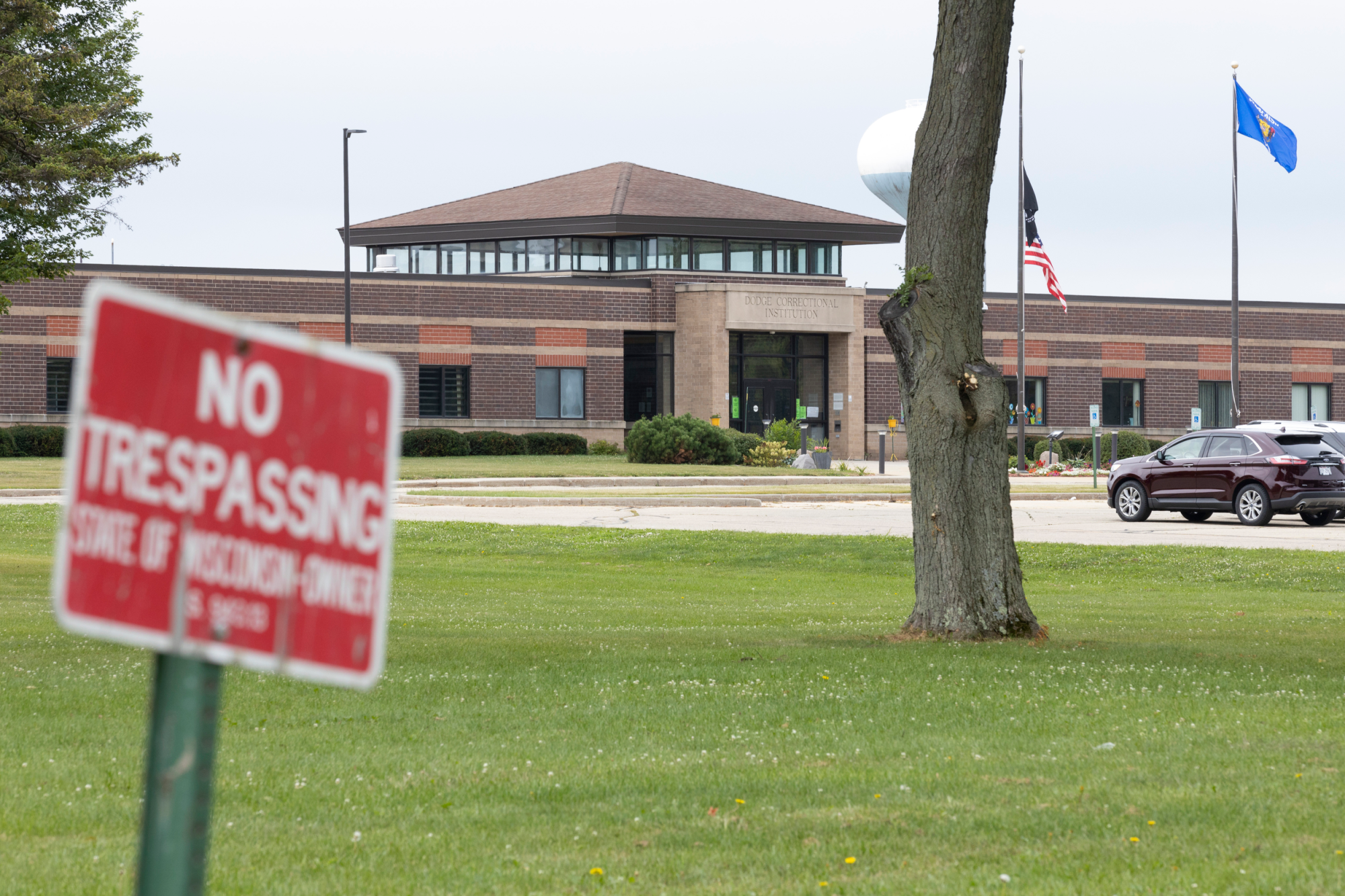Gov. Tony Evers Vetoes Uber Drivers, Parole Violation Bills
Governor vetoed 5 bills Friday afternoon and signed 17 others, including several related to health care and policing.

Superior Mayor Jim Paine and Gov. Tony Evers greet each other on Hammond Avenue in Superior where the city and Superior’s privately-owned water utility are partnering to replace lead pipes. Danielle Kaeding/WPR
Gov. Tony Evers on Friday vetoed five bills, including one that would have created a portable benefits program for many gig workers and another that could have sent thousands of formerly incarcerated people back to prison for violating release conditions.
In veto messages, Evers argued that the gig workers program was hastily contrived and took away protections from gig drivers “in the absence of any guaranteed benefit for workers.”
“App-based drivers are a growing segment of Wisconsin’s workforce and changes to independent contractor definitions are a serious endeavor — one that demands substantive conversations among several parties, including with both management and workers, in order to achieve an appropriate and balanced policy that all sides can support,” he said.
And he argued that recommending more revocation of parole or probation conditions would be hugely expensive without a proven benefit to public safety.
Evers also signed 17 bills sent to his desk by the GOP-held Legislature, including one that would allow specially qualified nurses to establish private practices, which advocates say would improve health care access in rural and underserved areas.
Gig worker bill was backed by delivery app companies
The gig workers bill would have created a “portable benefits” program for people who drive for app-based courier services like Uber or Lyft, or delivery services like DoorDash or InstaCart, to pay into a benefits system that is essentially tied to the worker, not the employer.
Proponents of the GOP-authored bill argued that this would allow people the flexibility of gig work while also having access to savings for health care, retirement or paid leave similar to a full-time employee.
Opponents, including Democrats and labor unions, said the bill — which required participating workers to identify as independent contractors — eroded workers’ access to fundamental protections, like workers’ compensation or a minimum wage.
Similar legislation exists in Alabama, Tennessee and Utah, according to the National Conference of State Legislatures. It was heavily backed by delivery apps, including DoorDash, which spent nearly $1.4 million lobbying at the Wisconsin Capitol in the first half of the year.
But while the bill was primarily championed by Republicans, some Democrats voted for its passage, arguing that many Wisconsinites, especially in urban centers, rely on gig income and some benefits are better than nothing.
In his veto message, Evers said he took issue with how the bill would de facto redefine independent contractors in the state, with what he said was too little discussion between all relevant players.
“I am open to finding a pathway to portable benefits; however, such a solution must be thoughtful, benefit workers, and be created through a process in which workers and management have the opportunity to participate, collaborate, and reach agreement,” he said.
In a statement, the Wisconsin AFL-CIO labor union said Evers’ veto protected app-based drivers from losing access to protections like unemployment insurance and overtime.
“Looking beyond the corporate spin, (the bill) would not provide workers with greater flexibility; it would not provide better pay; it would not guarantee workers any additional benefits,” said union President Stephanie Bloomingdale. “Legislation that makes the loss of important worker rights a certainty while holding out the possibility of flexible benefits if and when the employer chooses to provide them is a bad deal for workers.”
But the rideshare app Uber released a statement saying that the veto stripped gig workers of access to an optional program that could offer savings benefits for Wisconsinites.
“The primary losers in the Governor’s veto are the thousands of drivers who now won’t get access to funding for healthcare, paid sick leave and retirement savings,” reads the statement. “Amid an affordability crisis, working Wisconsinites deserve better. Uber will continue to fight for drivers desire to be their own boss – we have always and remain committed to talking to all stakeholders.”
Bill would have required DOC agents to recommend revoking parole after new charges
Evers also vetoed a bill that would require agents with Wisconsin’s Department of Corrections to recommend revocation of probation or parole — in other words, a return to prison — if a previously incarcerated person is charged with a new crime.
Currently, the DOC has some flexibility about whether to recommend revoking parole. While judges have the final say, opponents of the bill say they tend to follow the DOC’s recommendation — nearly 90 percent of the time, by one estimate.
Some estimates show thousands of people could have been sent back to prison under the proposed changes. One figure provided by Wisconsin’s Department of Administration estimated the requirements could eventually increase Wisconsin’s prison population by roughly 4,600 people.
 The Dodge Correctional Institution is shown on Aug. 29, 2024, in Waupun, Wis. Joe Timmerman/Wisconsin Watch
The Dodge Correctional Institution is shown on Aug. 29, 2024, in Waupun, Wis. Joe Timmerman/Wisconsin Watch
About 60,000 people are currently out on community supervision under Wisconsin’s existing rules about releasing people from prisons under parole or other forms of supervision, according to the DOC.
Republicans who backed the bill said it would enhance penalties on repeat offenders. It was also supported by some law enforcement groups, who argued it would keep communities safer.
Opponents, including the American Civil Liberties Union of Wisconsin, said targeting people charged with — but not convicted of — crimes would cause prison populations to balloon unnecessarily while doing away with due process.
Several groups representing county sheriffs expressed concerns that the bill would increase costs for their local jails without commensurate state support
In his veto letter, Evers also pointed to the price tag on the requirement — an estimated $330 million in two years — and argued that there would be no corresponding improvement to public safety.
“I object to the unfunded mandate that such revocation would impose on the Department of Corrections, which would move Wisconsin in the wrong direction on criminal justice reform without improving public safety,” he said.
“Wisconsin should be investing in data-driven, evidence-based programming that addresses barriers to reentry, enhances educational and vocational opportunities for individuals who will be released after completing their sentence, and provides treatment for mental health and substance use issues, which will help to reduce recidivism and save taxpayer money while improving public safety,” he added.
Evers signs bills on health, policing
Evers also signed 17 bills. In addition to the advanced practice nursing bill, which underwent a decade’s worth of revisions and advocacy — and versions of which had been vetoed by Evers in the past — he also signed off on several bills related to health and policing.
Those include bills to:
- Expand eligibility for caregivers supporting family members with Alzheimer’s disease;
- Require hospitals to obtain consent from patients before performing pelvic examinations;
- Make threats to jurors and their family a separate form of battery, and also classify it a felony;
- Increase penalties for harming police dogs and other animals used by police or firefighters.
That last bill was inspired by the 2021 shooting of a German shepherd who worked for the Kenosha County Sheriff’s Office. That dog, K9 Riggs, survived and served for three more years before retiring. On Friday, shortly after Evers signed the bill into law, the Kenosha County Sheriff’s Office announced that the dog had died.
Gov. Tony Evers vetoes gig worker, parole violation bills was originally published by Wisconsin Public Radio.
If you think stories like this are important, become a member of Urban Milwaukee and help support real, independent journalism. Plus you get some cool added benefits.



















Incorrect link, directed to pharmacists and oral contraceptives, rather than hospitals requiring consent prior to pelvic exams.
https://www.wpr.org/news/pharmacists-contraceptives-wisconsin-assembly-senate-headwinds
Does this include outpatient clinics (Family Medicine, Ob/Gyn and STD/STI clinics?)
The wording on the bill requiring consent before hospital may conduct pelvic exams, relates specifically to unconscious patients. The bill would prevent teaching hospitals from using unconscious patients as subjects in teaching pelvic exams.
There is another bill that would allow pharmacists to prescribe birth control without having a written prescription from a doctor. This article made no mention of it. I suspect it either hasn’t made its way to the Governor, or he has not acted on it.